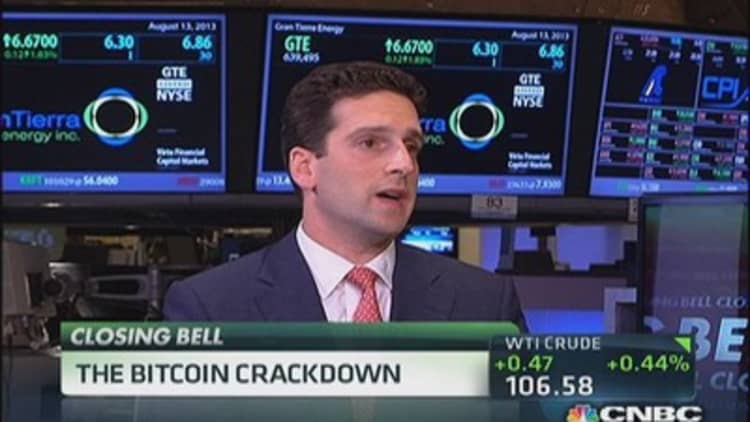U.S. authorities are now a major bitcoin player—owning $3.6 million in the digital "currency"—following their closure of online marketplace Silk Road.
The price of virtual currency used as payments in online deals fell around 20 percent on Wednesday on news of the arrest by the FBI before regaining ground quickly to trade at $125 on Thursday morning.
But one question that remains for lovers of the currency was how the FBI was planning on getting rid of the 0.22 percent of the total market share that it now holds.
The FBI arrested Silk Road's alleged owner, Ross William Ulbricht, otherwise known as "Dread Pirate Roberts," who appeared in a San Francisco courtroom on Wednesday. He has been charged with conspiracy in narcotics trafficking, computer hacking and money laundering. The website is believed to have generated 9.5 million bitcoins worth of sales.
(Read more: US busts 'Dread Pirate' on cyberdrug Silk Road)
"If they delete it, it would definitely have a temporary impact on the market because it would take out some of the supply," Jon Matonis, executive director of the Bitcoin Foundation, told CNBC.
The foundation aims to promote and protect bitcoin, a virtual currency that allows users to exchange online credits for goods and services. While there is no central bank that issues them, bitcoins can be created online by using a computer to complete difficult tasks, a process known as mining. Some 11.75 million bitcoins are believed to be in circulation, with a cap of 21 million—meaning no more bitcoins can created after that point.
Matonis said he had little clue as to whether the FBI would choose to liquidate the seized bitcoins into dollars at a later point. If it did, the FBI would need to select and contact a bitcoin exchange to perform the transaction.
Alternatively it could simply delete the stash, similar to burning illegal substances, but the FBI should make available the identifying alphanumeric figures of each bitcoin it holds, Matonis said.
(Read more: Bitcoin gets the FBI, Homeland treatment)

The Silk Road raid was not a win or lose situation for bitcoin, Matonis told CNBC. The 20 percent price drop was seen as a reaction by users to liquidate their positions with the fear that the authorities could trace their activities though the currency, but Matonis dismissed this.
"Bitcoin users need to be reassured," he said. "It was not a vulnerability in the protocol that led to the arrest," he said, but added that users should be traceable and are usually linked to a person's identity.
The FBI and Department of Homeland Security have led independent investigations into virtual currencies this summer after lawmakers asked both agencies for any information, plans or strategies on how it currently or plans to treat bitcoin and similar currencies.
(Read more: Beware of bitcoin-related Ponzi schemes, says SEC)
A leaked internal document from April 2012 revealed the FBI had concerns that the digital payment system was helping criminals hide from authorities and anticipated increased money laundering activities for bitcoin.
More recently in May, an indictment was filed by U.S. prosecutors against an alternative currency exchange called Liberty Reserve that accused the Costa Rica-based company of helping criminals around the world to launder illicit funds.
The FBI was not immediately available for comment when contacted by CNBC.
—By CNBC.com's Matt Clinch. Follow him on Twitter @mattclinch81



